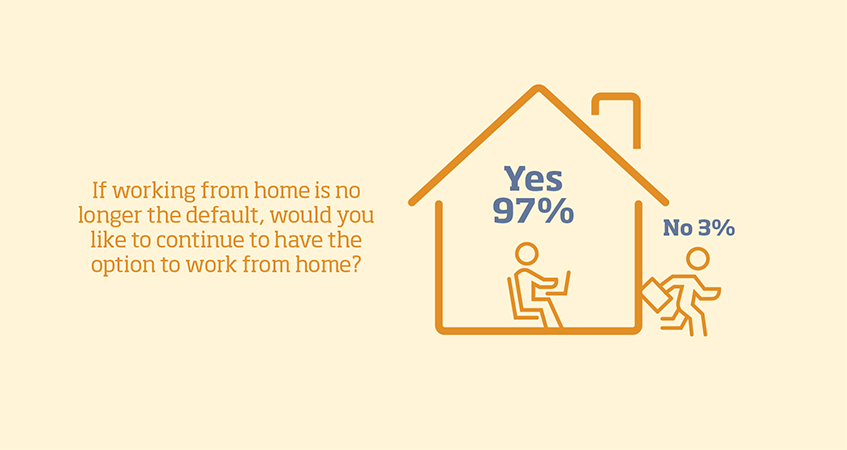Working Hours Survey: 97% want to continue working remotely

The latest FDA Working Hours Survey found an overwhelming majority of respondents wanted to continue to have the option to work from home, with a preference for a more flexible approach to home working if it was no longer the default.
The key findings were:
- 97% have been performing all or most of their work from home.
- 41% of those say they are more effective working from home, while only 15% say less.
- 68% say their working patterns have changed during the pandemic – this is pretty evenly split between starting earlier (34%), working later (36%) and variable patterns (31%).
- 97% would like to continue to have the option for work from home in future, if working from home is no longer the default.
- Of those, only 13% would want to work from home 100% of the time, with the others preferring a more flexible approach. 26% of respondents would like to work from home for 80% of the week, 32% would like to work from home for 60% of the week, 20% would like to work from home for 40% of the week, and 9% would like to work from home for 20% of the week.
- 69% are working more hours now than before the pandemic, with a third working 5 or more additional hours.
- Nearly half (48%) say their work/life balance has improved/greatly improved, against 37% who say it has worsened/ greatly worsened.
- 45% have used ALL of their previous commuting time to work, and a further 46% have used some of it.
- 22% feel they have not been provided with the necessary equipment for safe home working.
- 73% have seen their workload increase over the pandemic, only 4% have seen it drop.
- 77% say working excess hours has adversely affected their general wellbeing at least some of the time.
The survey had a record number of responses this year, with nearly 2,400 public servants sharing their views on working hours and conditions, and the impact of the COVOD-19 pandemic on their working lives.
2020 has seen our public sector perform extraordinary feats, whether it was building the furlough scheme from scratch or keeping an already stretched justice system functioning. Therefore, it is no surprise that the results show two thirds of respondents are working longer hours now than they were before the pandemic.
Our previous surveys have told us that the working of excessive hours is a problem across the public sector, and the unprecedented response that has been required of FDA members and their colleagues during the public health emergency has added to those existing problems. More than two thirds of respondents believe that the working of excessive hours is a problem in their organisation, but only 15% are aware of their employer taking any steps to address the issue.
The results also paint a very concerning picture of the impact this has on the mental wellbeing of our public servants, with more than three quarters reporting that working excess hours has adversely affected their wellbeing. The FDA’s Assistant General Secretary Lucille Thirlby says employers must do more to support their staff, especially in these worrying times:
“The high level of engagement with our working hours survey shows that this is an issue of huge concern across the civil service. The pandemic has clearly exacerbated problems in departments around the working of excessive hours, and it is deeply worrying that just over half of respondents feel that their mental wellbeing has suffered since March. Clearly departments must do more to ensure staff are properly supported while working remotely.”
However, the survey results also raise big questions about the future of work and show overwhelmingly that FDA members have no desire to see a complete return to pre-COVID ways of working. Thirlby argues that many public servants “have adapted and thrived while working from home.”
“The fact that 97% of respondents would like to continue to work from home at least some of the time in future shows there has been a permanent shift in attitudes to working practices. The FDA will therefore be using these findings to build a case for a future of working across the civil service that promotes flexibility and ensures a better work-life balance for all our members.”
Related News
-

“New low” for government’s relationship with civil service – FDA responds following departure of Cabinet Secretary Chris Wormald
The FDA has responded to the announcement that Sir Chris Wormald has departed the role of Cabinet Secretary, with FDA General Secretary Dave Penman describing it as a “new low” for the government’s relationship with the civil service.
-

“Farcical” to wait until 2030 to make decision on restoration and renewal of parliament, says FDA
The FDA has responded to the latest publication of UK Parliament’s Restoration and Renewal Board, ‘Delivering restoration and renewal of the Palace of Westminster: the costed proposals.’
-

NICS reform can only be delivered with political leadership, says FDA
The FDA has called for strong political leadership to address the structural issues facing the Northern Ireland Civil Service, in response to the NI Audit Office report, ‘Capacity and Capability: Follow Up Report’.